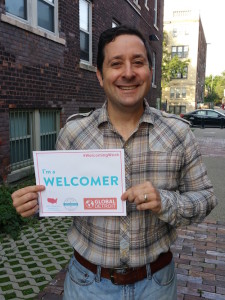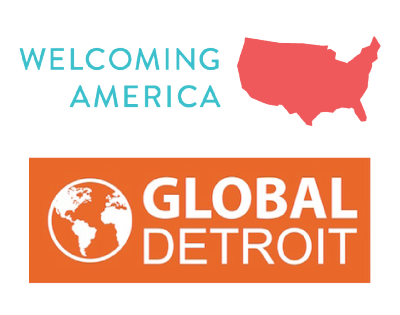Welcoming Week: A Reflection on America’s “Golden Door”

Steve Tobocman is a Welcomer! Snap a photo with the I Am a Welcomer sign and post it to social media with the hashtags #AmericaWelcomes and #WelcomingWeek. Click Steve’s photo to get the sign and find other ways to take action.
As the grandson of Jewish grandparents who fled Poland in the early 20th Century only to have all of their remaining family perish in the Holocaust, I grew up with a strong belief in the United State as the world’s haven for those fleeing persecution, oppression, and tyranny. I remember learning the powerful words of Emma Lazarus that are inscribed on the pedestal of the Statue of Liberty during my temple’s Sunday School classes:
From her beacon-hand glows world-wide welcome . . . ‘Give me your tired, your poor, your huddled masses yearning to breathe free, the wretched refuse of your teeming shore. Send these, the homeless, tempest-tost to me, I lift my lamp beside the golden door!’
The gripping pictures of a lifeless Syrian boy—approximately the same age and dress as my own two-year-old son Adiv—on a Turkish shore last week is enough to shock even the busiest American parent. Considering that the UN High Commission on Refugees has now registered over 4 million Syrian refugees and some 2,500 refugees have perished at sea trying to escape the conflict, the humanitarian issues facing the current crisis are truly catastrophic.
This week marks the fourth annual National Welcoming Week, during which communities all across America will celebrate the nation’s welcoming nature and the contributions that immigrants and refugees have made to our communities. The week’s events bring immigrants and refugees together with their neighbors in a spirit of unity.
Given the gripping headlines about the Syrian refugee crisis, this year’s Welcoming Week should provide ample opportunity for Americans to reflect on how our region could play a pivotal role in responding to the crisis and how our response would impact our local communities. This past May, the New York Times ran an editorial entitled “Let Syrians Settle Detroit,” noting that Metro Detroit’s “vibrant and successful” Arab-American community could help make our region more welcoming than others for resettling Syrians. Specifically, the editorial commented that, “From its original Native Americans to the Great Migration of Southern blacks to the infusion of Hispanic and Arab immigrants, Detroit has been a melting pot of religions, ethnicities and cultures.” Welcoming can be the difference maker in successful refugee resettlement and integration.
The reality is that refugee resettlement in communities across the nation would provide specific and tangible economic benefits to the local communities that serve as the new home for suffering families. A recent economic impact study on refugee resettlement efforts in Greater Cleveland concluded that the resettlement of some 4,500 refugees from 2000-2012 in the Cleveland metro area created $48 million in economic activity and 650 jobs in 2012 alone.
German Chancellor Angela Merkel has grabbed international headlines and praise for her leadership in pledging to accept as many as 800,000 Syrian refugees in the coming year. In addition to the deep humanitarian significance for Germany to define itself as a safe harbor for refugees, observers have been quick and correct to point out that her actions are motivated also by economic self-interest. With declining birth rates and a rapidly-aging workforce—conditions that plague Detroit, Cleveland, the Midwest, and many American communities—Syrian refugees represent an opportunity to inject new labor and energy into Germany’s economy. Merkel is planning for Germany’s long-term economic prosperity.
Midwesterners and Americans need to look no farther than the Minneapolis/St. Paul region to realize that serving as a hub for refugee resettlement can strengthen our economy and secure our long-term prosperity. Home to tens of thousands of Hmong, Somali, Vietnamese and other ethnic residents—most of whom can trace refugee resettlement histories as part of their community’s migration story—the Twin Cities possesses one of the fastest-growing economies and highest per capita incomes in the Midwest.
No doubt there are complex geo-political issues that need to be carefully considered in resolving the Syrian, other Middle Eastern, and African refugee crises, but one aspect that should not be in dispute is the local economic benefits to economies like Metro Detroit, Cleveland, Minneapolis/St. Paul, and Germany. Refugees bring new energy, resourcefulness, and an eagerness to pursue freedom and opportunity. It’s the same recipe that brought my grandparents to Detroit and millions of others’ families to America.
This Welcoming Week let us celebrate those contributions and resolve to welcome the world’s newest “tempest-tost.”



